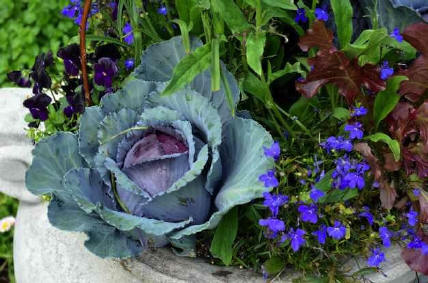
(5/12) Millennials (those between the ages of 18-34) are establishing themselves as the brand new gardening experts. This generation is bigger in numbers than Baby Boomers, comprising an estimated 25% of the U.S. population. It is rewarding to see young people interested in gardening. Millennials are fascinated by horticultural practices and what they can grow
themselves. This developing interest in food gardening is a great way for an older generation of gardeners to connect with their children and grandchildren. It is rewarding for mature gardeners to witness a younger generation’s interest in gardening and new gardening ideas and techniques.
One-third of millennials are interested in growing produce and more than 25% are learning about sustainable gardening methods and purchasing organic eco-products. If all your landscape is ornamental, attain a millennial’s respect by including some edibles in your plantings. Gardening practices through the years have evolved into planting flowers and vegetables in
separate garden areas. Vegetable gardens have been strategically placed in an out-of-sight area in the backyard. But gardening techniques are changing.
 Vegetable plants are bursting out of their traditional roles and are growing together in harmonious splendor with perennials and annuals. Gardeners are successfully integrating vegetables into their flower garden designs. Vegetables add texture, color, and personality to a flower garden. An additional
complementary benefit is that flowers attract pollinators and beneficial insects that are crucial for vegetable development. Vegetables offer vibrant and bold colors intertwined among flowers and create a flattering and symphonic vision of beauty. Mixing edibles such as Kale and Swiss chard with ornamentals creates an exciting horticultural experience.
Vegetable plants are bursting out of their traditional roles and are growing together in harmonious splendor with perennials and annuals. Gardeners are successfully integrating vegetables into their flower garden designs. Vegetables add texture, color, and personality to a flower garden. An additional
complementary benefit is that flowers attract pollinators and beneficial insects that are crucial for vegetable development. Vegetables offer vibrant and bold colors intertwined among flowers and create a flattering and symphonic vision of beauty. Mixing edibles such as Kale and Swiss chard with ornamentals creates an exciting horticultural experience.
Millennials have rediscovered the joys of using native plants for landscaping. They are concerned about the environment and are growing native plants that can attract pollinators. Naturalizing your landscape creates great family conversations among different generations. Millennials have a strong desire to make the world a better place and contribute to the greater
good. Twenty-nine percent see themselves as good stewards of the earth. If this doesn’t warm the heart of a mature gardener, I don’t know what will.
Not only are millennials concerned about the environment, but they are tech savvy. They are spending numerous hours online researching products and services and sharing their opinions and creations with their friends. They are likely to trust the opinions of friends and peers. They have been raised with technology as part of their everyday lives so it spills into their
gardening endeavors.
Millennials are experimenting with indoor gardening. Under lights, ripe heirloom tomatoes can be harvested in January and tender sweet lettuce can be picked in August. Technology is making indoor gardening easier and more successful. Innovations such as hydroponic "water boxes" and "grow towers" prove that large amounts of food can be produced in small, indoor spaces
without sunlight or soil. Growing gardens indoors under lights in soil, hydroponically or aquaponically, is becoming mainstream. The word "hydroponics" comes from two Greek words, "hydro" meaning water and "ponics" meaning labor. The concept of soil-less gardening or hydroponics has been around for thousands of years. The Hanging Gardens of Babylon and The Floating
Gardens of China are two of the earliest examples of hydroponics.
Hydroponic gardening has several advantages over soil gardening. The growth of a hydroponic plant is 30% to 50% faster than a soil-grown plant grown under the same conditions, and the yield of the plant is also greater. The extra oxygen in the hydroponic growing mediums helps to stimulate root growth. Plants with ample oxygen in the root system also absorb nutrients
faster. The nutrients in a hydroponic system are mixed with water and sent directly to the root systems. The plants do not have to search in the soil for the nutrients that they require. Those nutrients are being delivered to the plants several times per day. Hydroponic plants also have fewer problems with bug infestations, fungi, and disease. In general, plants grown
hydroponically are healthier and more content.
The Penn State Master Gardeners welcome millennials and any generation to invest in becoming a Master Gardener. New concepts, ideas, and technologies are welcome assets because Master Gardeners thrives on education and learning new and exciting gardening philosophies. Reap the benefits of the technologies and theories that are natural for millennials and enjoy with
excitement the benefit of new horticultural techniques utilized by the millennial generation.